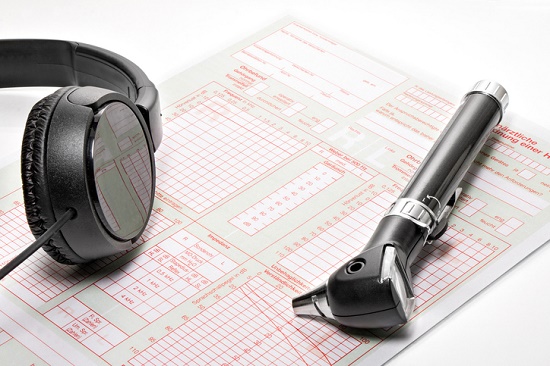
The hearing test really is the easy part. The challenging part is acknowledging your hearing loss and actually booking the hearing test in the first place.
You’ve more than likely read the stats by now: 48 million people in the US have hearing loss but only a small fraction actually do something about it, and only 20 percent of those who would benefit from hearing aids actually wear them.
So if you’ve already arranged your hearing test, well done, you’ve already conquered the largest obstacle to better hearing.
The hearing exam, as you’ll notice, is an easy, non-invasive process that will uncover the degree of your hearing loss to help develop the most suited treatment course.
After you first arrive at the office, you’ll begin by completing some paperwork. Then, you’ll meet with your hearing care professional to discuss your hearing health history.
Your Hearing Health History
Your hearing loss, if existing, can be brought on by direct exposure to loud noise, the natural aging process, or by an underlying ailment. You’ll want to exclude any underlying medical conditions before moving on to the actual hearing test.
If you have an impaction of earwax, as an example, you could be hearing better within a few minutes after a professional cleaning. The presence of any other ailments will be evaluated and the appropriate referral made, if necessary.
After examining your general medical history, you’ll discuss your subjection to loud sounds, your hearing loss symptoms, and what you would like to achieve with better hearing.
It’s critical to determine potential causes, how symptoms are adversely affective your life, and how better hearing will improve your life, which is after all the whole point. Be skeptical of the practitioner that doesn’t seem to really care about the main reasons why you want to improve your hearing to begin with.
Testing Your Hearing
There’s one more step to take prior to starting the hearing test: the visual evaluation of the ear with an instrument known as an otoscope. This will help in ruling out any issues with the ear canal, the eardrum, or the elevated buildup of earwax.
Next, you’ll be accompanied to a sound-treated room with your hearing care provider. You’ll be instructed to wear headphones, and the specialist will start to play you some sounds.
You’ll be presented with various sounds at assorted frequencies, and you’ll be requested to identify the quietest sounds you can hear at each frequency. This is called your hearing threshold, and the hearing care professional will record these values on a chart known as an audiogram.
The hearing test may also incorporate speech testing, where you’ll be instructed to repeat the words delivered to you. Assorted types of words, delivered at different volumes with and without background noise, will be introduced. This will help establish if hearing aids can help you with speech understanding.
When the hearing test is over, your hearing care provider will go over the results with you.
Reviewing Your Hearing Test Results
Referring to your audiogram, your hearing care professional will now discuss your hearing in both ears. Depending on the results, your hearing will be characterized as normal or as displaying mild, moderate, severe, or profound hearing loss.
If a hearing loss is present, the next move is discussing your treatment options. Since there are no existing medical or surgical treatments to restore hearing damage, this means comparing your hearing aid options.
Modern hearing aids come in a wide array of shapes, sizes, and colors, at a variety of prices with several advanced functions and features. In choosing your hearing aids, it’s essential to work with an expert hearing care professional for three main reasons:
- They can help you find the ideal hearing aid model to meet all of your goals.
- They can help you determine the advanced functions you need—along with the ones you don’t—at a price that accommodates your budget.
- They can program your new hearing aids to amplify only the sounds you have difficulty hearing—identified by the hearing test—ensuring optimal sound quality.
And that’s it, a fast, easy process in return for a lifetime of better hearing. We’d say that’s a very good deal.
We look forward to seeing you!
